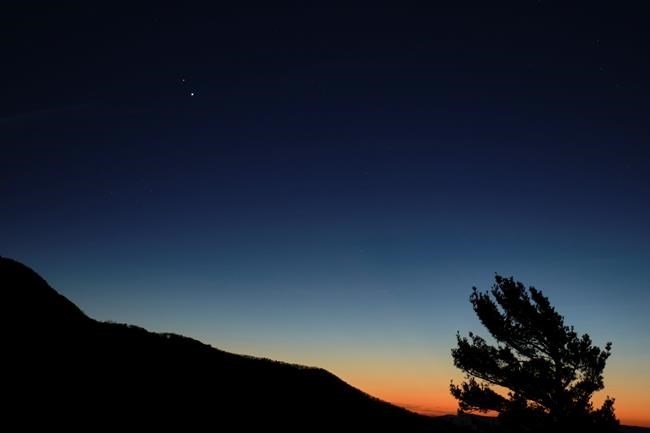
In this Sunday, Dec. 13, 2020 photo made available by NASA, Saturn, top, and Jupiter, below, are seen after sunset from Shenandoah National Park in Luray, Va. The two planets are drawing closer to each other in the sky as they head towards a "great conjunction" on Monday, Dec. 21, where the two giant planets will appear a tenth of a degree apart.
Image Credit: (Bill Ingalls/NASA via AP)
December 21, 2020 - 3:30 PM
Today marks the winter solstice, the time of year when the northern hemisphere experiences a day with the least amount of daylight making tonight the longest night of the year.
The winter solstice officially arrived at 2:02 p.m. today, Dec. 21, according to TimeandDate.com. The sun rose today at 8 a.m. and will set at 3:58 p.m.
It’s the time of year when the sun reaches its furthest southern point in the sky, marking the astronomical start of winter in the northern hemisphere.
This year, Dec. 21 is extra special as two other celestial events are lined up to be at their most prominent this evening.
The Great Conjunction of 2020 happens tonight as Saturn and Jupiter appear so close to each other they almost appear as a single planet. A conjunction of tonight’s magnitude hasn’t been seen on Earth in around 800 years.
A similar event is theorized to have been seen around the time of the birth of Christ and referred to as the Christmas Star of Bethlehem.
Tonight’s viewing of the Great Conjunction can be seen along the southwestern horizon between 5:30 and 7 p.m., if we are fortunate enough for the skies to clear, which it this point doesn't look likely.
Tonight and tomorrow also marks the peak of the last meteor shower of 2020, as the Ursids appear in the night sky.
According to Earthsky.org, this year’s Ursid shower will see between five to 10 meteor streaks in the sky each hour. The best viewing hours are just before dawn.
While it looks like it will be cloudy tonight, the Environment Canada forecast is calling for clear nighttime skies tomorrow and Wednesday.
To contact a reporter for this story, email Steve Arstad or call 250-488-3065 or email the editor. You can also submit photos, videos or news tips to tips@infonews.ca and be entered to win a monthly prize draw.
We welcome your comments and opinions on our stories but play nice. We won't censor or delete comments unless they contain off-topic statements or links, unnecessary vulgarity, false facts, spam or obviously fake profiles. If you have any concerns about what you see in comments, email the editor in the link above.
News from © iNFOnews, 2020